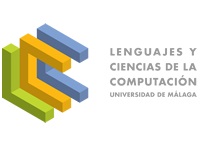Conferencia: "Design of Information Systems: UML Modeling Concepts and Introduction to USE"
 1
/
1
1
/
1

Impartida por el Prof. Martin Gogolla (Universidad de Bremen, Alemania) y organizada por el Departamento de Lenguajes y Ciencias de la Computación
Día: jueves 15 de noviembre de 2018
Hora: 12:45
Lugar: Sala de Grados A - E.T.S. Ingeniería de Telecomunicación
Abstract:
The Object Constraint Language (OCL) started as a complement of the UML notation with the goal to overcome the limitations of UML (and in general, any graphical notation) in terms of precisely specifying detailed aspects of a system design. Since then, OCL has become a key component of any model-driven engineering (MDE) technique as the default language for expressing all kinds of (meta) model query, manipulation and specification requirements. This talk provides a view of this language, its many applications, and the available tool support that the UML-based Specification Environment (USE) provides for writing and simulating UML and OCL models.
Biography:
Martin Gogolla is a Professor for Computer Science at University of Bremen (Germany) and is the head of the Research Group Database Systems. His research interests include software development with object-oriented approaches, formal methods in system design, the semantics of languages, and formal specification. Before joining the University of Bremen he worked for the University of Dortmund and the Technical University of Braunschweig. His professional activities include: Teaching computer science; publications in journals and conference proceedings; publication of two books; speaker to university and industrial colloquia; referee for journals and conferences; organizer of workshops and conferences (e.g., the UML conference); member in international and national program committees; contributor to international computer science standards (OCL 2.0 as part of UML 2.0). Martin Gogolla is actively participating in the MODELS conference (as Program Committee member, Program Chair, Steering Committee member, Steering Committee chair, Workshop organizer, Educators' Symposium Organizer). Martin Gogolla is also involved in the organization of the OCL workshops and the ICMT conference. In his group, foundational work on the semantics of and the tooling for UML, OCL and general modeling languages has been carried out. The group also develops the OCL and UML tool USE (UML-based Specification Environment) since about 15 years. The tool is internationally and nationally widely accepted and employed for research and teaching.






